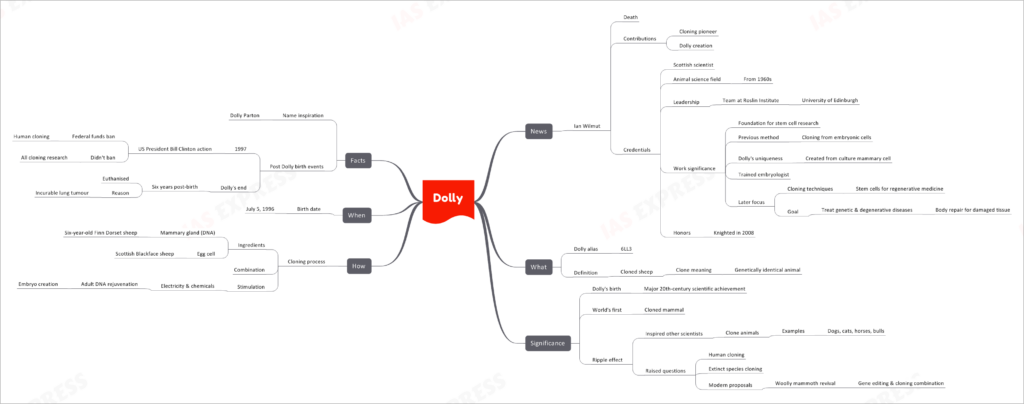Dolly

In the world of science and genetics, the name “Dolly” is synonymous with groundbreaking achievement. On July 5, 1996, a Scottish scientist named Ian Wilmut, working at the Roslin Institute, University of Edinburgh, forever changed the landscape of cloning and stem cell research by introducing Dolly, the world’s first cloned mammal.
This topic of “Dolly” is important from the perspective of the UPSC IAS Examination, which falls under General Studies Portion.
Who Was Dolly?
Ian Wilmut’s Contributions
- Death: Sadly, Ian Wilmut, the scientist behind Dolly’s creation, has passed away, leaving behind a remarkable legacy.
- Cloning Pioneer: Ian Wilmut will always be remembered as a pioneer in the field of cloning, with Dolly’s creation as one of his most significant accomplishments.
Credentials of Ian Wilmut
- Scottish Scientist: Ian Wilmut was a Scottish scientist who made substantial contributions to the field of animal science.
- Long History: His involvement in animal science dates back to the 1960s.
- Leadership: He was part of a dedicated team at the Roslin Institute, affiliated with the University of Edinburgh.
Work’s Significance
- Foundation for Stem Cell Research: Dolly’s creation laid the foundation for extensive research into stem cells.
- Previous Cloning Methods: Before Dolly, cloning primarily involved using embryonic cells.
- Dolly’s Uniqueness: Dolly was unique as she was created from a cultured mammary cell.
- Trained Embryologist: Ian Wilmut was a trained embryologist, which enabled him to develop advanced cloning techniques.
- Later Focus: He later shifted his focus to using cloning techniques for regenerative medicine, aiming to treat genetic and degenerative diseases and facilitate body repair for damaged tissues.
Honors
- Knighted in 2008: In recognition of his groundbreaking work, Ian Wilmut was knighted in 2008 for his contributions to science and cloning technology.
What Dolly Was
Dolly’s Alias
- 6LL3: Dolly was sometimes referred to as “6LL3” in scientific circles.
Definition
- Cloned Sheep: Dolly was a cloned sheep, which means she was a genetically identical animal created through the process of cloning.
Significance
- Dolly’s Birth: Dolly’s birth was a major scientific achievement in the 20th century, capturing the world’s attention.
- World’s First Cloned Mammal: She was not just any cloned animal; she was the world’s first cloned mammal.
- Ripple Effect: Dolly’s creation inspired other scientists to explore cloning in various animal species, including dogs, cats, horses, and bulls.
- Raised Ethical Questions: Dolly’s existence raised important ethical questions, especially concerning human cloning and the potential revival of extinct species.
- Modern Proposals: Her legacy even extends to modern proposals, such as the use of gene editing and cloning techniques to revive extinct creatures like the woolly mammoth.
How Dolly Was Created
Cloning Process
- Ingredients: Dolly’s creation involved DNA from a six-year-old Finn Dorset sheep’s mammary gland and an egg cell from a Scottish Blackface sheep.
- Combination: These ingredients were combined using advanced cloning techniques.
- Stimulation: Stimulation through a combination of electricity and chemicals rejuvenated the adult DNA, leading to the creation of an embryo.
When Did Dolly Arrive?
Birth Date
- July 5, 1996: Dolly was born on this historic day, marking a significant milestone in the world of science.
Interesting Facts
Name Inspiration
- Dolly Parton: Dolly was named after the famous American singer Dolly Parton, adding a touch of pop culture to the scientific breakthrough.
Post-Dolly Birth Events
- 1997: In the year following Dolly’s birth, U.S. President Bill Clinton took action by banning federal funds for human cloning research while allowing other cloning research to continue.
- Dolly’s End: Sadly, Dolly’s life was relatively short, as she was euthanized six years after her birth due to an incurable lung tumor.

